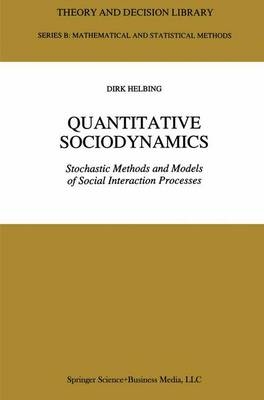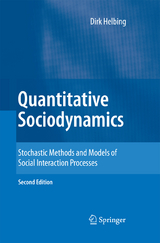
Quantitative Sociodynamics
Stochastic Methods and Models of Social Interaction Processes
Seiten
2010
|
1995 ed.
Springer (Verlag)
978-90-481-4482-2 (ISBN)
Springer (Verlag)
978-90-481-4482-2 (ISBN)
- Titel erscheint in neuer Auflage
- Artikel merken
Zu diesem Artikel existiert eine Nachauflage
Quantitative Sociodynamics presents a general strategy for interdisciplinary model building and its application to a quantitative description of behavioural changes based on social interaction processes. Originally, the crucial methods for the modeling of complex systems (stochastic methods and nonlinear dynamics) were developed in physics but they have very often proved their explanatory power in chemistry, biology, economics and the social sciences. Quantitative Sociodynamics provides a unified and comprehensive overview of the different stochastic methods, their interrelations and properties. In addition, it introduces the most important concepts from nonlinear dynamics (synergetics, chaos theory). The applicability of these fascinating concepts to social phenomena is carefully discussed. By incorporating decision-theoretical approaches a very fundamental dynamic model is obtained which seems to open new perspectives in the social sciences. It includes many established models as special cases, e.g. the logistic equation, the gravity model, some diffusion models, the evolutionary game theory and the social field theory, but it also implies numerous new results.
Examples concerning opinion formation, migration, social field theory; the self-organization of behavioural conventions as well as the behaviour of customers and voters are presented and illustrated by computer simulations. Quantitative Sociodynamics is relevant both for social scientists and natural scientists who are interested in the application of stochastic and synergetics concepts to interdisciplinary topics.
Examples concerning opinion formation, migration, social field theory; the self-organization of behavioural conventions as well as the behaviour of customers and voters are presented and illustrated by computer simulations. Quantitative Sociodynamics is relevant both for social scientists and natural scientists who are interested in the application of stochastic and synergetics concepts to interdisciplinary topics.
List of Figures. List of Tables. Preface. Introduction and Summary. I: Stochastic Methods and Nonlinear Dynamics. 1. Master Equation in State Space. 2. Boltzmann-Like Equations. 3. Master Equation in Configuration Space. 4. The Fokker--Planck Equation. 5. Langevin Equations and Nonlinear Dynamics. II: Quantitative Models of Social Processes. 6. Problems and Terminology. 7. Decision Theoretical Specification of the Transition Rates. 8. Opinion Formation Models. 9. Social Fields and Social Forces. 10. Evolutionary Game Theory. 11. Determination of the Model Parameters from Empirical Data. List of Symbols. References. Index.
| Erscheint lt. Verlag | 8.12.2010 |
|---|---|
| Reihe/Serie | Theory and Decision Library B ; 31 |
| Übersetzer | Richard Calek, Dirk Helbing |
| Zusatzinfo | Illustrations |
| Verlagsort | Dordrecht |
| Sprache | englisch |
| Maße | 160 x 240 mm |
| Gewicht | 544 g |
| Einbandart | Paperback |
| Themenwelt | Mathematik / Informatik ► Mathematik ► Angewandte Mathematik |
| Naturwissenschaften ► Physik / Astronomie ► Astronomie / Astrophysik | |
| Naturwissenschaften ► Physik / Astronomie ► Thermodynamik | |
| Sozialwissenschaften ► Soziologie ► Empirische Sozialforschung | |
| Wirtschaft ► Betriebswirtschaft / Management | |
| ISBN-10 | 90-481-4482-5 / 9048144825 |
| ISBN-13 | 978-90-481-4482-2 / 9789048144822 |
| Zustand | Neuware |
| Informationen gemäß Produktsicherheitsverordnung (GPSR) | |
| Haben Sie eine Frage zum Produkt? |
Mehr entdecken
aus dem Bereich
aus dem Bereich
Buch | Softcover (2024)
Springer Vieweg (Verlag)
37,99 €
Buch | Softcover (2024)
Springer Vieweg (Verlag)
44,99 €



